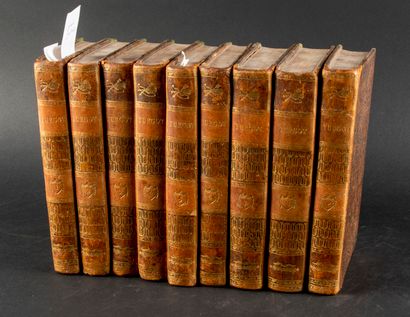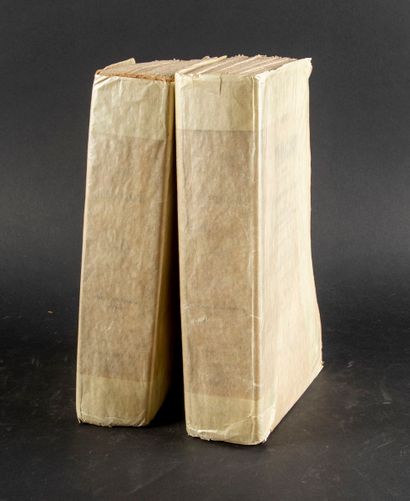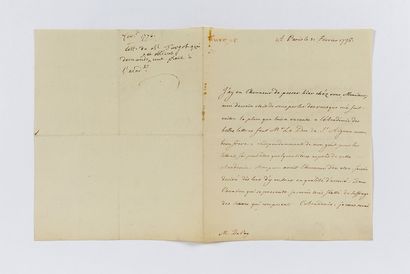TURGOT, Anne-Robert-Jacques- Baron de l'Aulne (1727-1781). A collection of twenty-eight autograph letters addressed to the Marquis de Condorcet, Limoges, Paris, Compiegne, Versailles, La Roche Guyon and Tremblai, 6 April 1770 - 15 October n.y. [1776] , referring to the poverty of his province, discussing at length chemistry and physics, particularly the calcination of metal, the theory of light, gravitation, fluids and the formation of chrystals ('Je me souviens pourtant ... d'avoir lu autrefois ... un beau theorem de Neuton d'ou il resulte qu'avec un pouce cube de matiere on peut remplir toute la sphere qui appourray a celui de l'orbite de Saturne'); referring to Scottish experiments with fixed air, and the difficulty of translating the term 'air fixé; or 'air fixe', and welcoming confirmation of Newton's experiments with flintglass; also writing of mathematics and logarithms, and in one letter enclosing a diagram; on astronomy, and asking about the purchase of instruments and a Flamstead catalogue for an astronomer at Limoges; writing of books and new works, mentioning one by Voltaire, a new article by Priestley, proposals for the Encyclopédie , and referring to his friends such as Morellet, D'Alembert, and most frequently Mademoiselle de l'Espinasse; after his appointment as Minister of the Navy in Paris, referring also to politics, the King and Court, and his attitude to religion, 'Ma proscription contre les devots n'est pas aussi generale que la votre parce que j'en ai vu qui etoient de tres honnetes gens', while continuing to discuss algebra and gravitation, approximately 85 pages, mostly 8vo , address panels (9), seals (occasional light spotting and dampstains in inner margins, tears in outer margins of 7 letters, one with loss of date), preserved in modern morocco-backed cloth. An important series of letters from one of the greatest 18th-century economists and statesman to his close friend and biographer, Marie-Jean-Antoine-Nicolas-Caritat, Marquis de Condorcet (1743-1794), mathematician and philospher. Together they knew almost all the most distinguished men of their day. Voltaire who met Turgot in 1760 wrote to D'Alembert that he had scarcely met a man more lovable or better informed, and the present letters reflect an extraordinary breadth of interest and learning, lightened by his humour and generosity. Turgot had been educated for the Church but turned to economics while still in his youth. His best known work on the creation and distribution of wealth appeared in 1766. He contributed to the Abbé Morellet's Dictionnaire de la Commerce , and is generally accepted as having influenced Adam Smith. In Paris he frequented all the most celebrated salons, and was associated particularly with that of Mademoiselle de l'Espinasse, often mentioned in the letters. In 1761 he was appointed Intendant of Limoges, including some of the poorest and most overtaxed districts of France, and 15 of the letters are written from Limoges, 'Je suis en cesse harcelé de lettres de toutes les parties de la province et encore plus de spectacle de la misere a laquelle tout de travail du monde ne peut remedier'. The remainder are written during visits, or after his appointment as Minister for the Navy in 1774. His enthusiastic discussion in several long letters (one of 12 pages) of problems of physics and chemistry reflects the remarkable spectrum of his learning. He refers to the past superiority of the English in science, writing à propos of a history of the Academy before 1699, 'il faut avouer qu'a cette epoque nous etions prodigieusement inferieurs dans les sciences aux Anglois, dont c'etoit le bontems, et meme aux Allemans', and discourses on many problems including the concepts of fluidity and mass, 'autre mistere. Supposerées vous l'element ou l'unite insensible semblable ressemble au plus grand. Mais comment l'assemblage de ces petites crystaux en formera t'il un grand semblable a ses elements'; elsewhere he proposes a method of findi
TURGOT, Anne-Robert-Jacques- Baron de l'Aulne (1727-1781). A collection of twenty-eight autograph letters addressed to the Marquis de Condorcet, Limoges, Paris, Compiegne, Versailles, La Roche Guyon and Tremblai, 6 April 1770 - 15 October n.y. [1776] , referring to the poverty of his province, discussing at length chemistry and physics, particularly the calcination of metal, the theory of light, gravitation, fluids and the formation of chrystals ('Je me souviens pourtant ... d'avoir lu autrefois ... un beau theorem de Neuton d'ou il resulte qu'avec un pouce cube de matiere on peut remplir toute la sphere qui appourray a celui de l'orbite de Saturne'); referring to Scottish experiments with fixed air, and the difficulty of translating the term 'air fixé; or 'air fixe', and welcoming confirmation of Newton's experiments with flintglass; also writing of mathematics and logarithms, and in one letter enclosing a diagram; on astronomy, and asking about the purchase of instruments and a Flamstead catalogue for an astronomer at Limoges; writing of books and new works, mentioning one by Voltaire, a new article by Priestley, proposals for the Encyclopédie , and referring to his friends such as Morellet, D'Alembert, and most frequently Mademoiselle de l'Espinasse; after his appointment as Minister of the Navy in Paris, referring also to politics, the King and Court, and his attitude to religion, 'Ma proscription contre les devots n'est pas aussi generale que la votre parce que j'en ai vu qui etoient de tres honnetes gens', while continuing to discuss algebra and gravitation, approximately 85 pages, mostly 8vo , address panels (9), seals (occasional light spotting and dampstains in inner margins, tears in outer margins of 7 letters, one with loss of date), preserved in modern morocco-backed cloth. An important series of letters from one of the greatest 18th-century economists and statesman to his close friend and biographer, Marie-Jean-Antoine-Nicolas-Caritat, Marquis de Condorcet (1743-1794), mathematician and philospher. Together they knew almost all the most distinguished men of their day. Voltaire who met Turgot in 1760 wrote to D'Alembert that he had scarcely met a man more lovable or better informed, and the present letters reflect an extraordinary breadth of interest and learning, lightened by his humour and generosity. Turgot had been educated for the Church but turned to economics while still in his youth. His best known work on the creation and distribution of wealth appeared in 1766. He contributed to the Abbé Morellet's Dictionnaire de la Commerce , and is generally accepted as having influenced Adam Smith. In Paris he frequented all the most celebrated salons, and was associated particularly with that of Mademoiselle de l'Espinasse, often mentioned in the letters. In 1761 he was appointed Intendant of Limoges, including some of the poorest and most overtaxed districts of France, and 15 of the letters are written from Limoges, 'Je suis en cesse harcelé de lettres de toutes les parties de la province et encore plus de spectacle de la misere a laquelle tout de travail du monde ne peut remedier'. The remainder are written during visits, or after his appointment as Minister for the Navy in 1774. His enthusiastic discussion in several long letters (one of 12 pages) of problems of physics and chemistry reflects the remarkable spectrum of his learning. He refers to the past superiority of the English in science, writing à propos of a history of the Academy before 1699, 'il faut avouer qu'a cette epoque nous etions prodigieusement inferieurs dans les sciences aux Anglois, dont c'etoit le bontems, et meme aux Allemans', and discourses on many problems including the concepts of fluidity and mass, 'autre mistere. Supposerées vous l'element ou l'unite insensible semblable ressemble au plus grand. Mais comment l'assemblage de ces petites crystaux en formera t'il un grand semblable a ses elements'; elsewhere he proposes a method of findi















Testen Sie LotSearch und seine Premium-Features 7 Tage - ohne Kosten!
Lassen Sie sich automatisch über neue Objekte in kommenden Auktionen benachrichtigen.
Suchauftrag anlegen